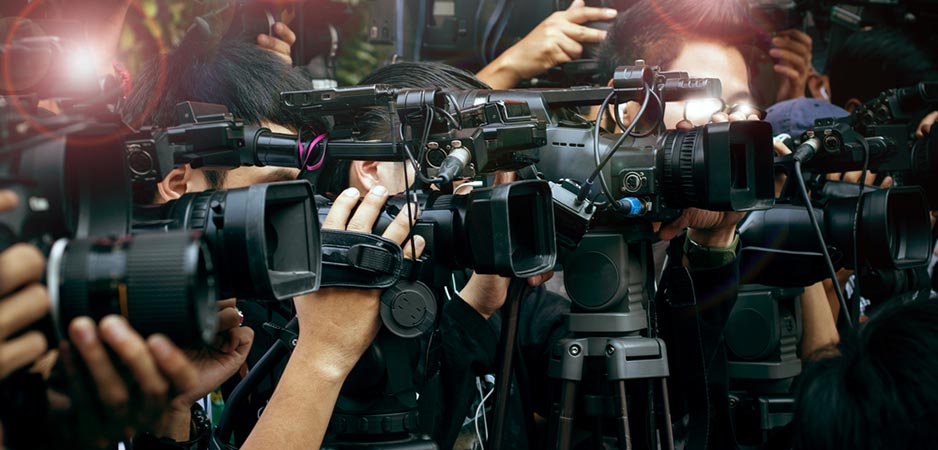The website FAIR calls itself a “national media watch group” whose mission consists of “scrutinizing media practices that marginalize public interest, minority and dissenting viewpoints.” All commercial news outlets tend to represent an often easily identifiable point of view on the political spectrum. FAIR, which identifies itself as “progressive,” aims to help its readers understand the inevitable distortion that occurs as a result of consciously applied editorial policies.
In an article highlighting the unique focus of serious media in the US on the unrest in Hong Kong at a time when significant protest movements have emerged across the globe, media analyst Alan MacLeod reminds us that “2019 may be remembered as the year of the protest, as demonstrations are engulfing the world.” He cites some examples: “From the Yellow Vests in France to demonstrations in Lebanon, Gaza, Chile, Ecuador and Haiti, sustained movements all over the planet have taken to the street demanding change.”
Here is today’s 3D definition:
Sustained:
Maintained for the period of time that takes a phenomenon beyond the status of ephemeral and indicates that it will be taken seriously by those interested in analyzing current events, with the exception of mainstream news media who see little value in what isn’t ephemeral
Contextual Note
Good news reporting involves describing with objectivity significant events taking place in the world. The events reported in the news can always be broken down into two categories: dramatic events and significant events. Some events — such as accidents or even many crimes — are dramatic but not significant. Others are significant without being dramatic, such as the House of Representatives hearings on the Trump impeachment, which Fox News complained lacked sex and drama. The best events to report are both dramatic and significant. Political protests tend to fall into that category.
To the extent that the criterion of significance conditions editorial selection, not only the facts of the events but also their meaning should be highlighted in responsible news stories. The lazy tack taken by many mainstream media today — at least concerning events that include some form of conflict — consists of reporting the facts and then, instead of delving into their meaning, simply reporting the opinions of people on both sides of the conflict. This means that even great societal problems are treated in the same way as a case of sexual assault, on the “he said/she said” basis. It also means that the problems reported on are treated as isolated events that stem from the disagreement of the “he’s” and the “she’s” involved in the events.
Disagreement is drama. One of the things that FAIR has noticed is that the news media prefer highlighting the drama to exploring the significance, especially if doing so would involve critiquing its readers’ assumptions. This is especially true if the owners of the media and/or their advertisers prefer to protect those assumptions.
FAIR takes the example of what many consider to be the most reliable and legitimate corporate media in the US: The New York Times and CNN. MacLeod highlights the fact that those media have made a point of selecting what they report and neglected to report on events that could contribute to the understanding of the events they chose to feature.
That neglect has enabled them to avoid reflecting on the very real historical significance of any of the events. Like climate change, the world is undergoing a disruptive and potentially massive destructive change in its understanding and practice of politics, especially politics executed in the name of democracy. Like climate change, this has produced a deep malaise in many nations.
FAIR remarks that, despite the global dimension of the malaise, US news media have focused only on the protests in Hong Kong. What the combination of protests demonstrates is that the potential for destabilizing regimes that claim to be democratic and, therefore, representative of the people is gaining steam. What they also appear to demonstrate is that the perception by the masses of the effects of a growing inequality of resources (money) and power has become the force driving these protests.
This perception has provided the factor that ensures their sustainability. Whereas protests in the past focused on single issues and could be solved by changes in policy, these will continue until they see a visible shift in the nature of the power structures that rule people’s lives. Minimal reforms or even more important ones that avoid calling into question the mechanics of inequality will only postpone the reckoning.
The yellow vest movement in France illustrates this aspect of the struggle. French President Emmanuel Macron counted on some carefully staged legal reforms and the effect of time (especially the traditional and sacred doldrums of the summer holidays) to take the wind out of the movement’s sails. It appeared to work. The media began announcing the end of the yellow vest movement.
Just this week, The Guardian offered this complacent (and mistaken) reflection, using the French term for yellow vests: “[Macron] has, more or less, fought off the gilets jaunes movement without doing a great deal for the struggling small towns and outer suburbs where it began.”
Many commentators in France assumed that the lack of serious organization and hierarchy among the yellow vests could only lead to failure. But the cause of their discontent lay deeper than the original pretext for the protests: rising gas prices. The movement quickly focused on the elitist culture symbolized by the president, an “énarque” (a graduate of the hyper-exclusive School of Administration) and former Rothschild bank whiz kid.
The embers of the resentment against privilege have remained alive to spark a new conflagration. What glowed yellow a year ago is now glowing red as the nation has embarked on a strike over today’s pretext: Macron’s retirement plan. The yellow vests and the unions, accompanied by retirees and even the police, have joined forces, increasingly intent on opposing the privileged caste that has ruled politics and the economy for decades.
Historical Note
While some of the protests are a response to very specific contexts of governmental or even personal abuse, many of them share common features that tell us something important about this special moment in history. Today, readers of the news can be entertained by such attention-grabbing events as Brexit and the Boris Johnson show, Democrats in the US charging the windmills of a Donald Trump impeachment, France’s yellow vests turning fashion into a means of political expression or Steve Bannon attempting to train populist gladiators.
None of these dramatic stories featuring larger-than-life personalities requires additional meaning to attract eyeballs and maintain suspense. The news services are thriving thanks to the superficial fireworks of events. And yet, even these stories are closely linked to something deeper belonging to the moment of history we are living in. In these columns, we have frequently referred to the “crisis of democracy,” a general trend that many have noticed even though it plays out differently according to the context.
A crisis of this type could be compared to a financial crash, such as that of 2008. The pillars of an existing system begin showing serious cracks and a number of edifices or institutions end up collapsing in front of the reporters’ very eyes.
Whatever solution our democratic or autocratic authorities end up proposing to quell the drama, and however effective such measures may be in the short or medium term, these events do more than cause immediate damage and suffering. They inevitably provoke or at least accelerate a paradigm shift by changing the entire population’s perception of how their institutions are structured and how they are meant to work. They deepen the gap between a perception that is becoming clearer and the official ideal (or ideology) of how things are meant to work.
As Al Jazeera reports, some of the high-profile activists in the protests have begun calling for “intersectional solidarity.” They see it as the key that would tie movements in distant places together, from “London to Beirut to Santiago and New Delhi.” To most serious observers, the creation of the equivalent of the Communist International seems highly unlikely.
Moreover, the idea that intersectionality could provide the key to making it happen — while pleasing to American and British activists focused on identity politics — appears to be delusional. Intersections allow people in vehicles to cross, not to meet, even less to discuss and plan. In any case, even if it were possible, we can count on the media to continue doing everything to prevent it not just from happening, but from being seen by anyone other than its official promoters.
*[In the age of Oscar Wilde and Mark Twain, another American wit, the journalist Ambrose Bierce, produced a series of satirical definitions of commonly used terms, throwing light on their hidden meanings in real discourse. Bierce eventually collected and published them as a book, The Devil’s Dictionary, in 1911. We have shamelessly appropriated his title in the interest of continuing his wholesome pedagogical effort to enlighten generations of readers of the news.]
The views expressed in this article are the author’s own and do not necessarily reflect Fair Observer’s editorial policy.
Support Fair Observer
We rely on your support for our independence, diversity and quality.
For more than 10 years, Fair Observer has been free, fair and independent. No billionaire owns us, no advertisers control us. We are a reader-supported nonprofit. Unlike many other publications, we keep our content free for readers regardless of where they live or whether they can afford to pay. We have no paywalls and no ads.
In the post-truth era of fake news, echo chambers and filter bubbles, we publish a plurality of perspectives from around the world. Anyone can publish with us, but everyone goes through a rigorous editorial process. So, you get fact-checked, well-reasoned content instead of noise.
We publish 2,500+ voices from 90+ countries. We also conduct education and training programs
on subjects ranging from digital media and journalism to writing and critical thinking. This
doesn’t come cheap. Servers, editors, trainers and web developers cost
money.
Please consider supporting us on a regular basis as a recurring donor or a
sustaining member.
Will you support FO’s journalism?
We rely on your support for our independence, diversity and quality.






